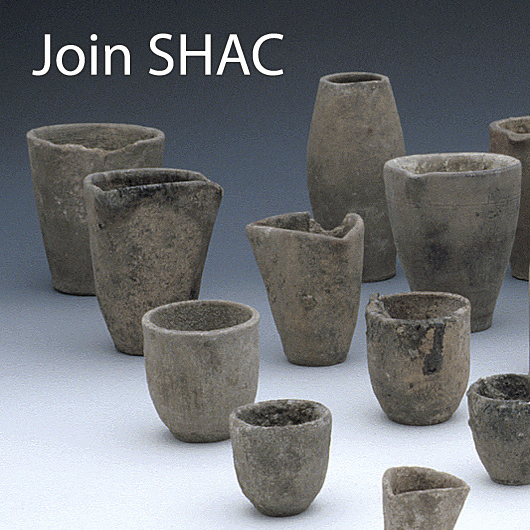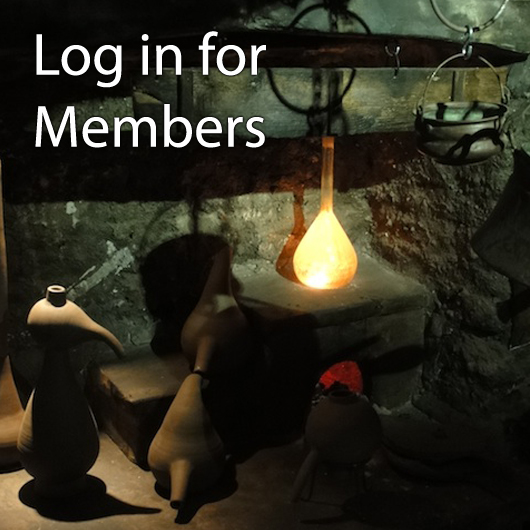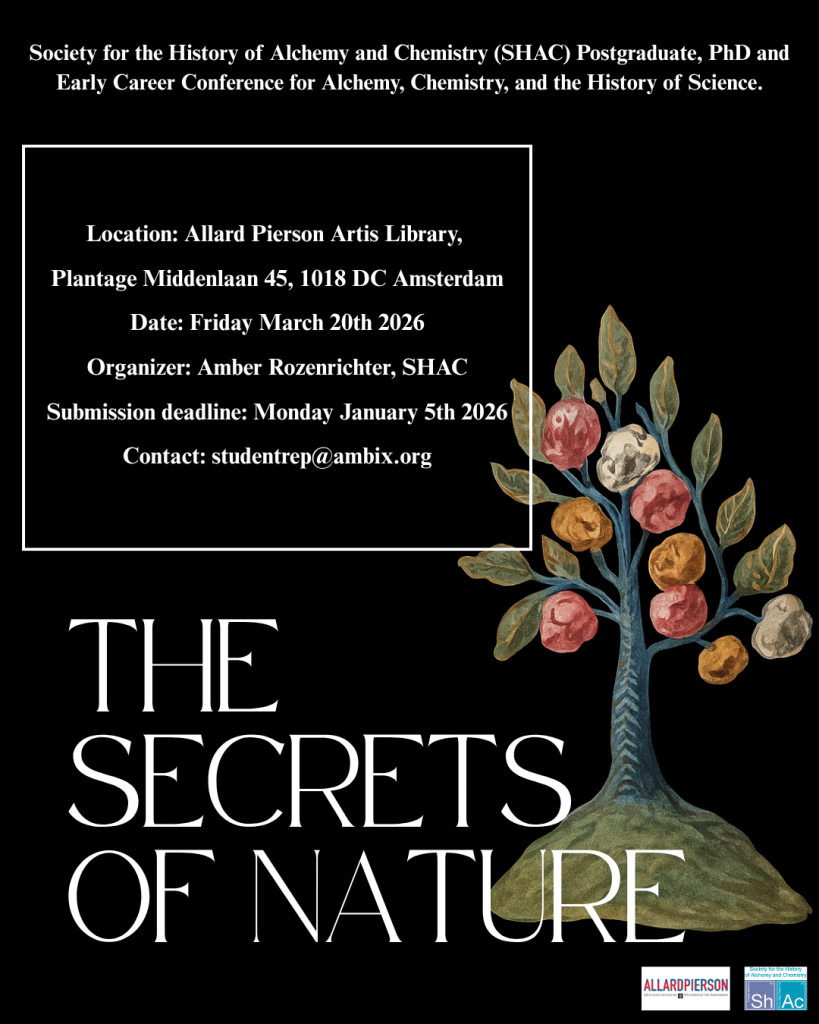Lots of SHAC events and activities are coming up in the next six months. We hope you can join us at one of them and that you enjoy the new publications.
Remembering Bill Brock
William ‘Bill’ Hodson Brock (1936-2025) was one of the leading historians of chemistry of the last fifty years. As Chair of SHAC and editor of Ambix he played a major role in the Society from the 1960s to the 2000s. He also wrote on the history of publishing, education and many other aspects of nineteenth-century science and culture, publishing in 1992 The Fontana/Norton History of Chemistry, a general history of chemistry from antiquity to the present. To commemorate his life, work and legacy, SHAC is organising a one-day meeting to be held on Friday 10 April 2026 at the Maison Française d’Oxford. Offers of papers (including a short abstract) related in some way to Brock’s work should be sent to Frank James (frank.james@ucl.ac.uk) by 30 November 2025.
Sources of Alchemy and Chemistry – Book of the Light of the Great Magistery
Lawrence M. Principe’s critical edition, English translation, and detailed study of the Book of the Light of the Great Magistery by the Franciscan friar, alchemist, and prophet of the antichrist John of Rupescissa (ca. 1310-1366) forms the third volume of Sources of Alchemy and Chemistry. It will appear in early 2026 as the supplement to the 2025 issue of Ambix. Based on over one hundred surviving manuscripts, many recently discovered, this critical edition restores substantial original text omitted from the printed editions and corrects longstanding textual errors. In the accompanying study, Principe explores John’s sources and ideas, and follows the transmission, reception, vernacularization, and multiple modifications of John’s text over the next three centuries. Modern experimental reworkings, fully illustrated and explained, complement the textual analyses and provide a more vivid understanding of the friar’s practical and observational skills. John intended this book to provide his Franciscan brethren with the financial means, through production of the philosophers’ stone, to rebuild a devastated Christendom after the fall of the antichrist whom he predicted would arrive in 1366. The new critical text and analyses reveal John as an innovative practitioner and theorist, and provokes a close re-examination of the conditions of his nearly twenty-year confinement at the papal prison in Avignon where he wrote his Book of Light.
SHAC Webinars
Recent talks include Francesca Antonelli on “Family historians? Women and the construction of scientific memory, from Mme Lavoisier (1758-1836) to Lucie Laugier (1822-1900)” and Ellen Hausner on “Early modern alchemical characters: the case of Simon Forman (1552-1611).” These can be viewed on the SHAC YouTube Channel: https://www.youtube.com/SocietyforHistoryofAlchemyandChemistry
The next webinar will take place on Thursday 27 November 2025 at 5pm GMT. Look out for details in SHAC member emails, social media, Chem-Hist and Mersenne.
SHAC Postgraduate and Early Career Conference – Call for Papers “The Secrets of Nature”
Friday 20 March 2026 at the Allard Pierson Artis Library, Plantage Middenlaan 45, 1018 DC Amsterdam. Deadline for submissions: January 5th 2026
This conference seeks to explore the relation between (al)chemical work and “The Secrets of Nature” within and beyond the laboratory. By foregrounding this theme, this conference emphasizes the central role of nature in Alchemy and Chemistry, disciplines that have been fundamental to the History of Science and to Intellectual History more broadly.
This conference invites participants to consider how the theme of Nature has been explored, represented, and debated across different contexts and periods. This topic allows for a wide range of approaches, from textual and visual analysis to conceptual and methodological reflections. The aim of this conference is to create an academic setting in which early career researchers can come together, share their work, and open new conversations about the place of the natural world in the history of alchemy and chemistry. We are delighted to announce that Prof. Dr. Frank James and Dr. Timothy Grieve-Carlson will deliver the keynote lectures at this event, which will be hosted in the Allard Pierson Artis Library, located in Amsterdam’s historic Plantage district. Surrounded by 19th-century architecture and botanical gardens, Artis has long been a center for the study and display of the natural world, playing a key role in the development of the History of Science in Amsterdam. Participants will also have the opportunity and are encouraged to engage with the rich collection of the State-owned part Bibliotheca Philosophica Hermetica of the Allard Pierson; the manuscripts and printed books from the collection are available for consultation, offering researchers the chance to work directly with sources. Access the collection online using the links provided below. https://www.allardpierson.nl/en/natural-history https://www.allardpierson.nl/en/collection/history-of-sciencehttps://www.allardpierson.nl/en/esotericism
Suggested topics include, but are not limited to:
● Conceptions of nature in alchemy, chemistry, and natural philosophy.
● (Al)chemical emblems and other visual strategies to transmit (al)chemical knowledge.
● (Al)chemical practice and the development of Early Modern medical knowledge in botanical gardens, for example the case of the Hortus Medicus in Amsterdam.
● Environmental history and historical understandings of the natural world.
● The transformation of substances: chemical processes and their conceptual frameworks.
We welcome proposals for 20 minute talks by graduate students, postdoctoral researchers, and early career scholars who have received their doctorate no more than three years ago. If you are interested in presenting your work, please send an abstract of approximately 300 words and a short bio to SHAC Student Representative Amber Rozenrichter at studentrep@ambix.org. The deadline for submissions is 5th January 2026.
If you have any questions please contact Amber Rozenrichter at the above email address.
Forthcoming Special Issue of Ambix – August and November 2025 Double Issue
The next issue of Ambix to be published will be a special double issue covering August and November 2025. It will explore the nature and agency of fire and its role in human interaction with the material world by focusing on premodern heat technologies. It takes a wide comparative view of different practices, including metalwork and distillation, with an emphasis on early modern Europe and pre-Hispanic South America. The double issue is scheduled to appear online in November and in print soon after. Remember online access to Ambix is included in your membership.
Partington Prize 2026 – Call for Entries
The Partington Prize is awarded every three years for an original and unpublished essay on any aspect of the history of alchemy or chemistry. The prize consists of five hundred pounds (£500), with the winning article published in SHAC’s Journal, Ambix. The competition is open to anyone with a scholarly interest in the history of alchemy or chemistry who, has not reached thirty-five years of age, or if older is enrolled in a degree programme or has been awarded a master’s degree or PhD within the previous three years. Entries must arrive before midnight GMT on 31 December 2025.
Examples of past-prize winning essays, including Armel Cornu’s 2023 Prize-Winning Essay, “Senses and Utility in the New Chemistry” can be found at https://www.tandfonline.com/journals/yamb20/collections/best-paper-partington-prize
Full details can be found in the May 2025 issue of Ambix and at: https://www.tandfonline.com/doi/full/10.1080/00026980.2025.2477948
Best regards
The SHAC Officers





